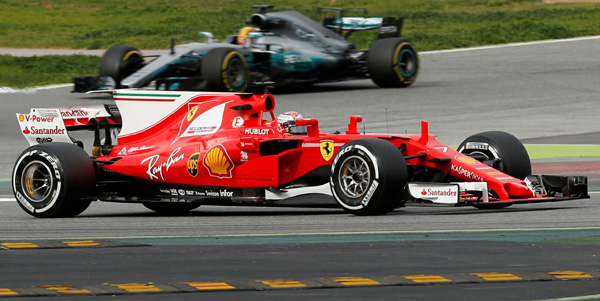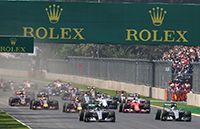Rule shake up to speed up F1
 |
|
Ferrari's Kimi Raikkonen is followed by Mercedes' Lewis Hamilton in Montmelo, Spain, during Formula One test session on Barcelona-Catalunya racetrack on February 28, 2017. [Photo/Agencies] |
With all of 2017's new Formula One cars and liveries revealed and the first preseason test in Barcelona well under way, it's time to have a look at some of the big regulation changes that have come into place for this season.
It had become a common complaint of many of the older and more experienced drivers, such as Fernando Alonso and Mark Webber, that F1 had become too safe, the cars too easy to drive. And so, the FIA finally listened, giving the F1 rulebook its biggest overall in almost a decade.
The new regulations have made the cars much faster, giving them more downforce, making them wider, and more aggressive in design. However, although the new machines look great for the most part (no one likes the shark fins), many drivers such as Lewis Hamilton have expressed their concerns that the increased cornering speeds and more sensitive aerodynamics could actually make it more difficult to overtake - an aspect critical to making races exciting for fans.
Almost everything about the 2017 season has been made bigger by the FIA. The width of the cars has increased by 20 cm to 2 meters, the first time since the late 90s that F1 cars have been that bulky. The tires have been beefed up too, with the rears alone increasing in width by 8 cm to 40.5 cm wide, which now almost resemble those slapped on the rear of a drag car.
As a result of fattening F1 up, the cars have gotten heavier with weights rising from 702 kg in 2016 to 722 kg this year. The fuel allowance per race has also increased, rising from 100 kg to 105 kg.
Particularly when viewed from above, the changes to the front wing are striking, taking on a pointy delta shape which angles back towards the tires, 20cm longer than last season.
Moving back along the car and the bargeboards alongside the driver have returned for 2017 providing engineers with greater opportunities to channel airflow around the chassis.
At the back, the rear wings are about the only things that have shrunk in 2017, with 15 cm chopped off and pulled on an angle away from the rear tires as if the wing itself is set to chill out for 2017.
The final major change which came as a surprise during many of the car unveilings last week was the return of the dreaded shark fin, not seen since 2011, which extends from the engine cover towards the rear wing. This turns out to be something the regulations forgot to exclude and a loophole that engineers are paid so handsomely to find.
Many people, including Red Bull's Christian Horner, have complained about the return of the shark fin aberration, saying that without it the 2017 cars look "fantastic".
Whether the new regulations, designed to speed up the cars, shake-up the field and hopefully provide an opportunity for teams to challenge Mercedes dominance over the past three years, it is yet to be clear.
On the first day of the opening test in Spain, one thing about the new rules proved true - the cars were faster, on average about three seconds per lap quicker.
Mercedes shot out of the blocks with Hamilton completing 73 laps and topping the time sheets with a 1:21.765, followed by Ferrari's Sebastian Vettel who completed 128 laps with a best time just 0.113 slower.
Red Bull and McLaren both had days to forget with their cars only having limited running due to reliability issues.
Valterri Bottas' first run in a Mercedes, after replacing retired world champion Nico Rosberg, was productive, finishing the day sixth.















